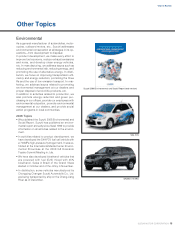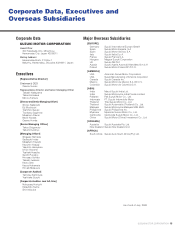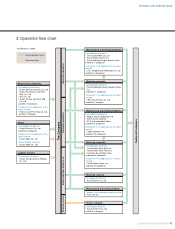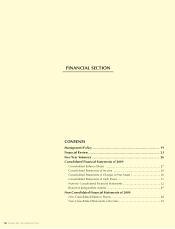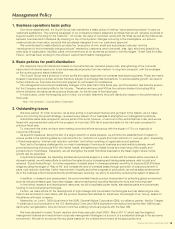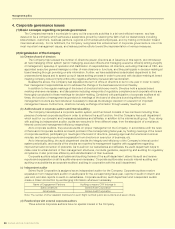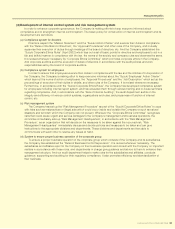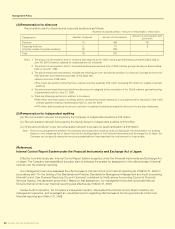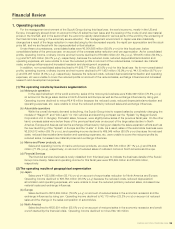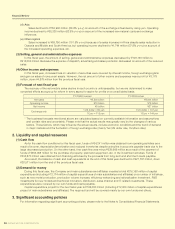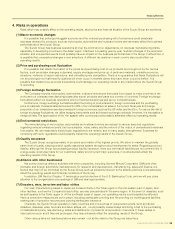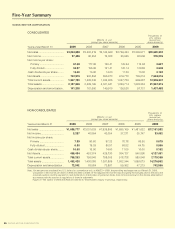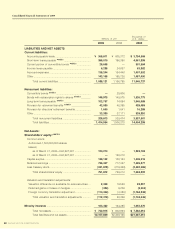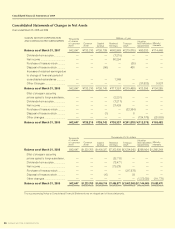Suzuki 2009 Annual Report Download - page 21
Download and view the complete annual report
Please find page 21 of the 2009 Suzuki annual report below. You can navigate through the pages in the report by either clicking on the pages listed below, or by using the keyword search tool below to find specific information within the annual report.
20 SUZUKI MOTOR CORPORATION
4. Corporate governance issues
(1) Basic concepts regarding corporate governance
The Company has made it a principle to carry out its corporate activities in a fair and efficient manner, and has
desired to be a company which achieves a sustainable growth by retaining the faith of all our stakeholders including
shareholders, customers, business partners, regional communities and employees, and by making contribution toward
international society. For its fulfillment, the Company recognizes that enhancement of corporate governance is one of its
most important management issues, and makes positive efforts toward the implementation of various measures.
(2) Organization of the Company
(a) Directors/board of directors
The Company has reduced the number of directors (eleven directors as of issuance of this report), and introduced
an new managing officer system (senior managing executive officers and managing executive officers) aiming at agility
of management, speedup of operation and clarification of responsibilities. All directors, excluding Chairman & CEO, are
appointed executive general manager or other of main divisions or functions, and they participate in decision-making at
board meeting through providing on-site information. Further, we have established a dedicated department to find
cross-sectional issues and to speed up such issues solving process in order to proceed with decision-making at board
meeting company-wide promptly without the negative effects by bureaucratic sectionalism.
Besides the above, the Company had stipulated the term of office of directors to be for one year in order to clarify
their management responsibilities and to address the change in the business environment flexibly.
In addition to the regular meetings of the board of directors held every month, Directors hold a special board
meeting whenever necessary, and discussions including viewpoints of regulatory compliance and corporate ethics are
thoroughly conducted in those meetings for decision-making. Combined with participation of corporate auditors at all
times, the function of management supervision in meetings of the board of directors is working effectively. And
management councils are held whenever necessary to discuss the strategic decision on execution of important
management issues. Furthermore, directors mutually exchange information through weekly meetings, etc.
(b) Auditors/board of corporate auditors and internal auditing
The Company has adopted a corporate auditor system, and their board consists of five members including three
persons of external corporate auditors in order to enhance the audit function. And the Company has audit department
which audit on our domestic and overseas subsidiaries and affiliates, in addition to the internal audit group. Thus, along
with auditing by independent auditor, audits are executed in three different ways, from the standpoint of compliance,
internal control and management efficiency respectively.
As to corporate auditors, they execute audits on proper management of the Company, in accordance with the rules
of the board of corporate auditors and audit policies of the corresponding fiscal year, by holding meetings of the board
of corporate auditors, participating in meetings of the board of directors, perusing approval documents and various
minutes, and receiving reports and explanation from directors on execution of business, etc.
As to internal auditing, the audit department checks the integrity and efficiency of the Company’s internal control
system periodically, and results of the checks are reported to management together with suggestions regarding
improvement and correction of problems. As to audit on our subsidiaries and affiliates, the audit department helps to
make rules for enhancement of their management structures, conducts guidance, supporting and auditing for regulatory
compliance. It also promotes efficiency and standardization of their business.
Corporate auditors adjust audit plans and auditing themes of the audit department, attend its audit and receive
reports and explanation on all its audits whenever necessary. Corporate auditors also execute internal auditing and
auditing on subsidiaries as corporate auditors’ auditing in cooperation with the audit department.
(c) Independent auditor
Seimei Audit Corporation is assigned as an independent auditor for the Company. Corporate auditors receive
explanation from independent auditor on audit plans for the corresponding fiscal year, reports on audit on interim and
year-end, and also reports on audit on subsidiaries. Corporate auditors, audit department and independent auditor
create a closer connection by exchanging information whenever necessary.
(d) Relationships with external corporate auditors
Three external corporate auditors have no special interest in the Company.
Management policy
Note: The number of other assistant members for audit: Eight certified public accountants and seven others.
Name of Engagement Partners Auditing company CPA belongs to
Satoru Imamura Seimei Audit Corporation
Akira Iwama Seimei Audit Corporation





